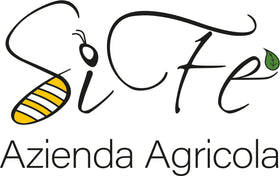I have always loved this world, looking at these little insects with such admiration and esteem. One day I got up and said to my wife Federica, "Amo', I want to become a beekeeper". Right from the start, she was by my side and we decided to start this small organic company. I studied, read books and took several courses.
Since the first family of bees arrived in our company, we have decided to adopt organic and sustainable beekeeping, placing the well-being of the bee insect first. Starting with organic beekeeping involves a very significant initial expense at the beginning, as you have to purchase a lot of organic wax, where the cost is around 3 times more than normal, as it is free of residues harmful to the man.
Sometimes I hear conventional beekeepers who report statements like, "I'm not organic, because the bees raid the fields for 3 km, and it's impossible to control a territory". Well I can assure you that this statement is completely false and I will now explain why.
For the last 30 years, bees have been suffering from a parasite called VARROA. This parasite is systematically fought by beekeepers with conventional methods and organic methods. Conventional methods are acaricides that are harmful to humans and unfortunately remain present in the wax. The wax is always recycled and reused from time to time. Organic methods, on the other hand, do not leave any fixed residue in the wax, organic wax is sold with analyzes where it is possible to trace its origin. The conventional one is sold without analysis at much lower prices. Wax is essential for bees. To better understand the function of wax and give you a better idea, I'll give you an example. Imagine many beautiful, shiny new cars that use a bumpy road full of potholes to get around... What happens to the cars? Here then, the cars represent the bees while the roads are the wax. Our company, however, does even more by using naturally constructed honeycombs... What does this mean? We use half an organic wax sheet and let our little friends build the other half. This makes the final product unique and free of acaricides and various rubbish harmful to humans... Are you still convinced to buy non-organic honey?

